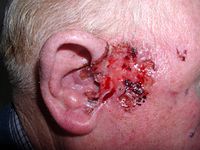
Photo from wikipedia
The aim of the present study was to identify the differentially expressed genes (DEGs) between primary tumor tissue and adjacent non-tumor tissue of hepatocellular carcinoma (HCC) samples in order to… Click to show full abstract
The aim of the present study was to identify the differentially expressed genes (DEGs) between primary tumor tissue and adjacent non-tumor tissue of hepatocellular carcinoma (HCC) samples in order to investigate the mechanisms of HCC. The microarray data of the datasets GSE76427, GSE84005 and GSE57957 were downloaded from the Gene Expression Omnibus database. DEGs were identified using the limma package in the R programming language. Following the intersection of the DEGs screened from the three datasets, 218 genes were selected for further study. A protein-protein interaction (PPI) network was constructed using the Search Tool for the Retrieval of Interacting Genes database. The construction and analysis of modules were performed using Cytoscape and the module with the highest score was selected for further analysis. Gene Ontology enrichment analysis and Kyoto Encyclopedia of Genes and Genomes pathway enrichment analysis were conducted for genes involved in the PPI network and the selected subnetwork. The network of the enriched pathways and their associated genes was constructed using Cytoscape. For the genes in the global PPI network, metabolism-associated pathways were significantly enriched; whereas, for the genes in the subnetwork, ‘cell cycle’, ‘oocyte meiosis’ and ‘DNA replication’ pathways were significantly enriched. To demonstrate the portability and repeatability of the prognostic value of the weighted genes, a validation cohort was obtained from datasets of The Cancer Genome Atlas and Kaplan-Meier survival analysis was conducted. Evidence is presented that the expression levels of aldehyde dehydrogenase 2 family member, cytochrome P450 family 2 subfamily C member 8, alcohol dehydrogenase 4 (class II), pi polypeptide, alcohol dehydrogenase 1B (class I), β polypeptide and cytochrome P450 family 2 subfamily C member 9 were associated with the overall survival of patients with HCC and that the expression levels of pituitary tumor-transforming 1, cell division cycle 20, DNA topoisomerase II α and cyclin B2 were negatively associated with the overall survival of patients with HCC. In conclusion, 9 weighted genes, involved in the development and progression of HCC, were identified using bioinformatics and survival analyses.
Journal Title: Molecular Medicine Reports
Year Published: 2019
Link to full text (if available)
Share on Social Media: Sign Up to like & get
recommendations!